|
|
|
Sort Order |
|
|
|
Items / Page
|
|
|
|
|
|
|
| Srl | Item |
| 1 |
ID:
147235


|
|
|
|
|
| Summary/Abstract |
ON 3 NOVEMBER 2015, UNDER THE WATCHFUL EYES of Saudi King Salman and Sudanese President Omar Al-Bashir, their respective finance ministers, Ibrahim Al-Assaf and Badredin Mahmoud, signed four agreements that committed the kingdom to funding three big dam projects in Sudan, as well as the cultivation and irrigation of more than a million acres near already-constructed dams on Sudanese territory.1 These framework accords were expanded upon when, in February 2016, Al-Assaf travelled to Khartoum to meet Mutaz Musa, Minister of Water Resources and Electricity and head of Sudan's hugely powerful Dam Implementation Unit. Ignoring the howls of anti-dam protesters assaulted by security forces, Al-Assaf committed US$5 billion in dam project finance to Sudan, which has struggled to revive economic growth following the secession of South Sudan in 2011 and the loss of three-quarters of its oil production. The multi-billion dollar promises are a quid pro quo for the participation of the Sudanese Armed Forces since March 2015 in the devastating war waged in Yemen against Houthi insurgents by King Salman and his 30-year-old Deputy Crown Prince, Mohammad.
|
|
|
|
|
|
|
|
|
|
|
|
|
|
|
|
| 2 |
ID:
147232
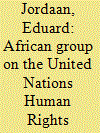

|
|
|
|
|
| Summary/Abstract |
During the early years of the United Nations Human Rights Council, formed in 2006, the African Group obstructed efforts to scrutinize and improve human rights in specific countries, notably in the cases of Darfur and the Democratic Republic of the Congo. However, in recent years the African Group has become willing to address country-specific human rights violations, particularly in Côte d'Ivoire, Libya, and Eritrea. This article documents the African Group's shift and asks why it occurred. Against the backdrop of debates about whether the liberal international order can survive a decline in American dominance, the study of the African Group's shift grants us insight into the elements that underpin liberal internationalism. Three explanations for the African Group's shift are considered: an improvement in the domestic human rights profile of African Group members, changes to the internal dynamics of the African Group, and the influence of the United States. The article concludes that American power was decisive, a finding that raises doubt about whether the liberal international order will survive a decline in American power.
|
|
|
|
|
|
|
|
|
|
|
|
|
|
|
|
| 3 |
ID:
147228
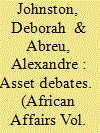

|
|
|
|
|
| Summary/Abstract |
Asset indices are ubiquitous in the debate about well-being in African countries, not least because of the paucity of traditional household income and expenditure data. Indeed, asset data have fuelled the creation of a new, more optimistic picture of well-being in Africa, where both income and the middle class are growing fast. This is the first review of the use of asset indices for African countries. Readers are guided through key debates over the use of asset data, including the use of assets to measure trends over time as well as socio-economic status and class. We argue that the theoretical and empirical advantages of the asset index over traditional welfare measures are clear, but that caution is needed. Most asset indices show significant improvements in private wealth and social welfare in African countries due to increases in the number of household assets and improvements in health and education. However, we argue that simplistic conclusions in the economics literature about the growth of income or of a ‘middle class’ using asset indices are poorly founded.
|
|
|
|
|
|
|
|
|
|
|
|
|
|
|
|
| 4 |
ID:
147230
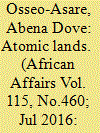

|
|
|
|
|
| Summary/Abstract |
The presence of a low-power 30 kW nuclear reactor at the Ghana Atomic Energy Commission (GAEC) in Kwabenya, a suburb of Ghana's capital city Accra, has exacerbated longstanding disputes over access to land there. The reactor complex has a five km radius of empty land as a buffer zone, but neighbouring residents have reclaimed what they perceive to be fallow land. An estimated 30 percent of the 2,000 acres of GAEC land has been lost to squatters and resale by families from Kwabenya, Haatso, and other nearby towns. This article traces the history of land disputes at Kwabenya from the earliest court records in the early twentieth century, through the expropriation of GAEC lands in the 1960s under President Kwame Nkrumah, to recent tensions after Ghana imported the reactor in 1994. A historical analysis of Atomic Lands in Ghana shows how competing interpretations of an exclusion zone may compromise nuclear security in African countries. The analysis is based on testimonies from court records, media reports, and extensive oral history interviews with residents, physicists, and entrepreneurs in Kwabenya. Their stories indicate that the Commission increasingly uses the potential of radiation on their properties to outmanoeuvre family claims to land. As Ghana and other African countries expect to expand their nuclear capabilities, a history of property disputes near one of the first nuclear programmes on the continent demonstrates the challenge of managing atomic lands.
|
|
|
|
|
|
|
|
|
|
|
|
|
|
|
|
| 5 |
ID:
147229
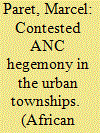

|
|
|
|
|
| Summary/Abstract |
Is ANC hegemony stable or in decline? The 2014 election provided support for both interpretations, as the ANC registered its fifth consecutive victory but with a declining share of the vote, especially in urban areas. In what ways and among which groups is the ANC maintaining its hegemony? This study draws on an exit survey of 3,782 voters in sixteen communities in and around Gauteng Province, with a particular focus on impoverished and protest-affected urban townships. The results show that while the ANC continues to derive power from its role as the party of national liberation, pluralistic party competition is deepening. This competition centres on the quality of governance and material provision such as houses and social grants, and is refracted through divisions based on age, gender, race, and ethnicity. Evidence also suggests that protests in communities and workplaces are translating into support for opposition parties such as the EFF, implying a broader challenge to ANC hegemony.
|
|
|
|
|
|
|
|
|
|
|
|
|
|
|
|
| 6 |
ID:
147233
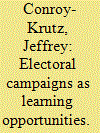

|
|
|
|
|
| Summary/Abstract |
While scholars have studied various aspects of election campaigns, they have not examined their effects on political knowledge in Africa. Since many problems are blamed on information scarcity, campaign-related learning could affect democratic development positively. This article focuses on the case of Uganda, using unique panel data from the 2010–11 campaign. I find that knowledge on office holders, candidates, and institutions increased significantly over the campaign. Importantly, these increases were not concentrated amongst the previously privileged, but also occurred amongst often-disadvantaged groups, such as women, the poor, the less-educated, and rural dwellers. In fact, the campaign seems to have diminished, although not eliminated, pre-existing knowledge gaps between advantaged and disadvantaged populations. It does not appear that Ugandans learned because the campaign made them more excited about politics, but rather because they were exposed to political communications, door-to-door canvassing, and increasingly politicized media content. Finally, knowledge increases are significantly correlated with increased criticism of institutions, but not with increased support for democracy or participation. While we cannot generalize to the rest of the continent, given that interest in a non-competitive campaign like Uganda's might be relatively limited, we might expect similar or larger learning effects in more-democratic settings.
|
|
|
|
|
|
|
|
|
|
|
|
|
|
|
|
| 7 |
ID:
147231


|
|
|
|
|
| Summary/Abstract |
While the percentage of women publishing in African Affairs and The Journal of Modern African Studies from 1993 until 2013 has increased, the percentage of articles by Africa-based authors has declined. We present evidence suggesting that this decline is not being driven by lower submission rates from Africa but rather by low and declining acceptance rates. We also find that Africa-based scholars, but not women, are systematically cited less than others. We then analyse article titles and find preliminary evidence suggesting that Africa-based authors are more likely to write on a small number of countries and less likely to generalize. Authors based outside Africa seem more likely to generalize to the continent and are more likely to write on economics or conflict. These patterns have implications for the diversity of the discipline and the state of our knowledge about Africa.
|
|
|
|
|
|
|
|
|
|
|
|
|
|
|
|
| 8 |
ID:
147234


|
|
|
|
|
| Summary/Abstract |
This research note argues that quantitative survey data on Africa, welcomed by most researchers in public health, economics, and political science, can make an important contribution to the work of historians and anthropologists, especially if it is open to critical analysis. The research note describes the 2012–13 ‘Knowing Each Other’ survey on religion among the Yoruba of south-west Nigeria, which provides strong evidence for a slow shift from Islam to Christianity in the area since 1963, and reflects on the methods and challenges of carrying out the survey and the resulting biases within it. In doing so, the research note draws out lessons on how to use surveys for historical and anthropological research. It also shows how using surveys contributes to understanding the complex and unexplored dynamics of Muslim–Christian relations in Nigeria from the perspectives of locality, age, and gender.
|
|
|
|
|
|
|
|
|
|
|
|
|
|
|
|
|
|
|
|
|